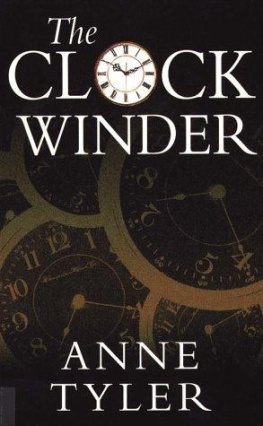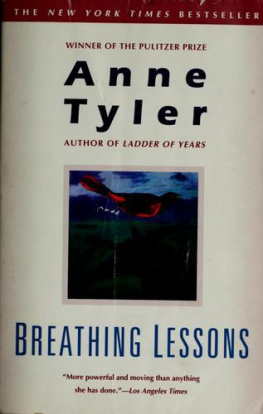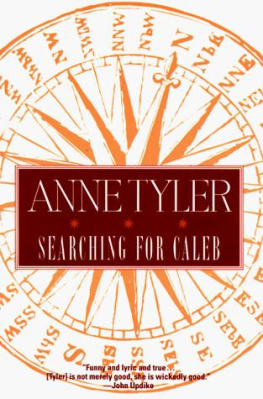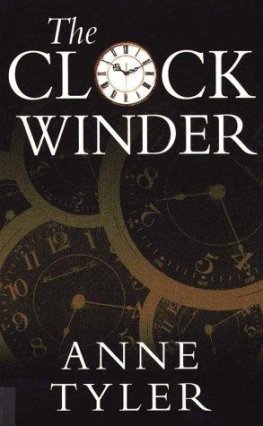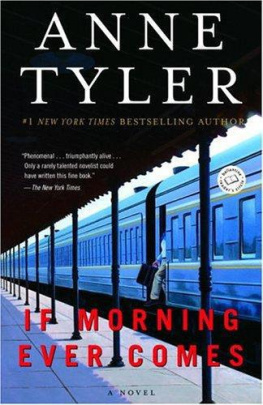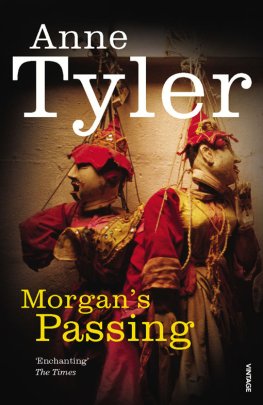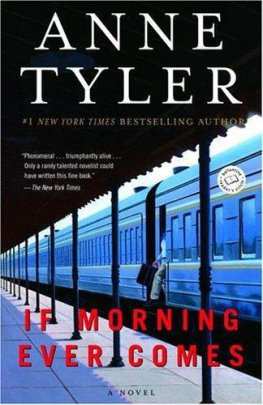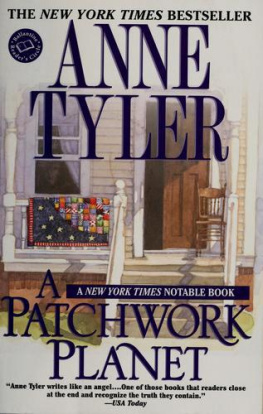Anne Tyler - Clock Winder
Here you can read online Anne Tyler - Clock Winder full text of the book (entire story) in english for free. Download pdf and epub, get meaning, cover and reviews about this ebook. year: 1996, publisher: Ballantine Books, genre: Art / Prose. Description of the work, (preface) as well as reviews are available. Best literature library LitArk.com created for fans of good reading and offers a wide selection of genres:
Romance novel
Science fiction
Adventure
Detective
Science
History
Home and family
Prose
Art
Politics
Computer
Non-fiction
Religion
Business
Children
Humor
Choose a favorite category and find really read worthwhile books. Enjoy immersion in the world of imagination, feel the emotions of the characters or learn something new for yourself, make an fascinating discovery.
- Book:Clock Winder
- Author:
- Publisher:Ballantine Books
- Genre:
- Year:1996
- Rating:4 / 5
- Favourites:Add to favourites
- Your mark:
- 80
- 1
- 2
- 3
- 4
- 5
Clock Winder: summary, description and annotation
We offer to read an annotation, description, summary or preface (depends on what the author of the book "Clock Winder" wrote himself). If you haven't found the necessary information about the book — write in the comments, we will try to find it.
Clock Winder — read online for free the complete book (whole text) full work
Below is the text of the book, divided by pages. System saving the place of the last page read, allows you to conveniently read the book "Clock Winder" online for free, without having to search again every time where you left off. Put a bookmark, and you can go to the page where you finished reading at any time.
Font size:
Interval:
Bookmark:
A NNE T YLER was born in Minneapolis, Minnesota, in 1941, but grew up in Raleigh, North Carolina. She graduated at nineteen from Duke University and went on to do graduate work in Russian Studies at Columbia University. Anne Tyer has written numerous novels. Breathing Lessons was awarded the Pulitzer Prize in 1988. She is a member of the American Academy and Institute of Arts and Letters. She and her husband, Taghi Modarressi, live in Baltimore, Maryland.


1960
The house had outlived its usefulness. It sat hooded and silent, a brown shingleboard monstrosity close to the road but backed by woods, far enough from downtown Baltimore to escape the ashy smell of the factories. The uppermost windows were shuttered: the wrap-around veranda, with its shiny gray floorboards and sky-blue ceiling, remained empty even when neighbors porches filled up with children and dogs and drop-in visitors. Yet clearly someone still lived there. A pile of raked leaves sat by the walk. A loaded bird-feeder hung in the dogwood tree. And in the side yard, Richard the handyman stood peeing against a rosebush with his profile to the house and his long black face dreamy and distant.
Now out popped Mrs. Emerson, skin and bones in a shimmery gray dress that matched the floorboards. Her face was carefully made up, although it was not yet ten in the morning. Whatever she planned to say was already stirring her pink, pursed lips. She crossed the veranda rapidly on clicking heels. She descended the steps gingerly, sideways, holding tight to the railing. Richard? she said. What is that I see you doing?
Just cutting back the roses is all, Richard said. His back was turned to her. He waved a pair of pruning shears behind him, hip-high.
I meant what youre doing at this moment, Richard.
Oh, why, nothing, Richard said.
It was true. He was zipped up by now, free to turn and beam and click his shears on thin air. Mrs. Emerson stopped in front of him and folded her arms.
Dont try to get around me, Richard. I looked out my window and saw you. I thought, Richard? Is that Richard?
I was preparing to cut back the roses, Richard said.
Is that what you call it?
Richard had a special set of gestures he made when embarrassedpivoting on his heels with his head hanging down, working something over in his hands. He twisted the rubber grips on his shears and said, Its getting time, now. Fall is coming on.
That house you are standing by is Mrs. Walter Bells, said Mrs. Emerson. In full clear view of her dining room window. Dont think that I wont hear about this.
I wasnt doing nothing, Mrs. Emerson.
Oh, hush.
I was only cutting back the roses.
Just hush. I dont know, I really dont know, said Mrs. Emerson.
Youre just distraught nowadays, thats all.
Distraught? Why would I be distraught? said Mrs. Emerson. Oh, give me those shears, hand them over. Youre fired.
Richard stopped twisting the shears. He looked up at her with his mouth open, his face jutting forward as if he had trouble seeing her. Ah, now, he said.
Ill cut back my own damn roses.
Now Mrs. Emerson, you know you dont mean that. Youd never just fire me. Why, I been working here twenty-five years, not counting the war. Planted them roses myself, watered them daily. Do I have to tell you that?
I dont know what kind of watering youre talking about, said Mrs. Emerson, but youre leaving anyway. Dont expect wages, either. Its only Monday, and you were paid Friday. Youve been here not half an hour yet and most of that time ill-spent. Oh, I looked out that window and thought I was seeing things. I thought, What have we come to, after all? Whats it going to be next? First Emmeline, letting my transistor radio run down, and then no sooner do I let her go than you start in. Well, you can send your new employers to me for a reference but dont expect me to cover up for you. Works well, Ill say, but tinkles on the flowers. Maybe some wont mind.
Couldnt you just take a little longer over this? Richard asked.
Mrs. Emerson raised her chin and looked past him, twiddling with the empty sleeves of her sweater. She said, Longer? Why should I take longer? Ive made up my mind.
But if you gave it your thought, some. Who could you find that would work as good as me?
Whole multitudes, said Mrs. Emerson, but I wont be looking. Im too disappointed. Everywhere I turn there is someone failing me. Well, thats the end of that. From now on Ill do it all myself.
Paint the shutters? Keep that creaky old plumbing fixed? Climb up to clean the gutters in them little spiky shoes?
Mrs. Emerson had already turned to go. She paused, lifting one hand to test a curl. It was a sign of uncertainty and Richard knew it, but then he had to go and ruin it for himself. Youll be calling me back, Mrs. E., he said. Youll call.
Never, said Mrs. Emerson.
Then she went off on tiptoe, to keep from sinking into the lawn.
She kept a pack of playing cards on the dining room table. She sat down on the edge of a chair, smoothing her skirt beneath her, and reached for the cards and began laying out a game of solitaire with sharp little snaps. Her breathing was too rapid. She made a point of slowing it, sitting erect, aligning the cards carefully before she started playing. But unfinished questions kept running through her head. Should she have? How could he? Why had she?
The sun from the bay window fuzzed the edges of the sweater draping her shoulders, lit the flecks of powder across the bridge of her nose. She had once been very pretty. She still was, but now that her children were grown there was something brave about the prettiness. She had started having to work for it. She had to fight the urge to spend her days in comfortable shoes and forget her chin-strap and let herself go. Mornings, patting a pearly base coat over her cheekbones, she noticed how she seemed to be falling into separate pieces. Her face was a series of pouches tenuously joined by transparent skin, reminding her of the tissue-covered frames of model airplanes that her sons used to make. Her close-set blue eyes were divided by minute cracks. Her mouth had bunched in upon itself so that she permanently wore the sulky look she had once had as a child. All she had left was colorpink, white, blond, most of it false. Weekly she went to the hairdresser and returned newly gilded, with her scalp feeling tight as if it were drawing away from her face. She dressed up for everything, even breakfast. She owned no slacks. Her thin, sharp legs were always in ultra-sheer stockings, and her closet was full of those spike-heeled shoes that made her arches ache. But when her children visited and she stood at the door to meet them, wearing pastels, holding out smooth white hands with polished nails, she had seen how relieved they looked. Relieved and a little disappointed: she had survived their desertion, she had not become a broken old lady after all.
She put the red seven on the black eight. Now the six could go up. She looked across the table, out the bay window, and saw Richard standing exactly where she had left him. His shoulders were slumped. The pruning shears were dangling from one hand. Would still more be expected of her? But as she watched he dropped the shears and started off toward the toolshed behind the house. She would have to put the shears away herself, then. She had no idea where they went.
She turned an ace up. Then another. Along came Richard, carrying an old suit jacket, a brown paper bag, a thermos bottle. He was plodding, that was the only word for it. Thinking she was watching. Well, she wasnt. She snapped the last card down, checked for possibilities one more time, and then hitched her bracelets back and gathered the cards into a deck again. When she next looked out the window, Richard was gone.
Font size:
Interval:
Bookmark:
Similar books «Clock Winder»
Look at similar books to Clock Winder. We have selected literature similar in name and meaning in the hope of providing readers with more options to find new, interesting, not yet read works.
Discussion, reviews of the book Clock Winder and just readers' own opinions. Leave your comments, write what you think about the work, its meaning or the main characters. Specify what exactly you liked and what you didn't like, and why you think so.

